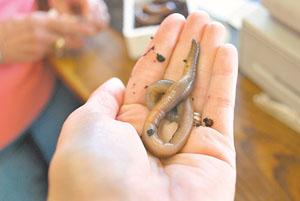Wigglers work
Published 12:00 am Monday, March 28, 2011

- A nightcrawler is displayed inside Ms. Jean Bait Shop on Spanish Lake. JESSICA GOFF / THE DAILY IBERIAN
March kicks off the official beginning of the spring, and according to the Farmer’s Almanac the month showcases the emergence of the “Full Worm Moon” — meaning that rising temperatures cause worm castings to be more prevalent in the soil.
Worm castings, also known as worm humus or worm manure can enrich soil more than nitrogen, phosphorus, carbon, and calcium, according to a report by the Louisiana Department of Environmental Equality.
Worms may not be for the squeamish, but are a positive sign of healthy soil, Chris Catsulis, of Iberia Gardens and Nursery said.
“Worms in your dirt is a good thing,” Catsulis said.
He said he gets few inquiries into the use of worms, but said they are an excellent tool to fertilize and aerate soil and aren’t hard to find.
“You can just dig them up when you need them,” he said. “They’re everywhere.”
The state DEQ recommends the use of a species of worm called eisenia fetida or lumbricus rubellus, which are most commonly known as red worms, red wrigglers or manure worms, for gardening.
The worms are commonly sold in local bait shops and are tolerant to a wide range of temperatures.
Jean Williams, owner of Ms. Jean Bait Shop on Spanish Lake said she has occasionally been visited by customers seeking red worms to use for compost.
Vermicomposting is the use of worms in compost and is most commonly used for organic gardening.
“You can make a compost — a lot of people have bought redworms from me to make wormbeds,” she said. “They’ve used bathtubs and old refrigerators. They lay the refrigerators down so that the worms can’t get out. You can do that — they cultivate the soil and make holes through the dirt.”
Like Catsulis, Williams said red worms aren’t hard to find in the area, just search under a pile of moist leaves with a shovel.
When raising worms for personal use, the state DEQ recommends using a wooden or plastic container lined with damp shredded newspaper and moist garden soil. Worms can eat half their weight in one day but aren’t picky about the menu, the report says.
Discarded table scraps ranging from used coffee grounds, leftover oatmeal and fruit peels are appreciated by the wigglers who in return will create their valued castings into the compost.
The rich soil is then ready to use for planting and fertilizing.





